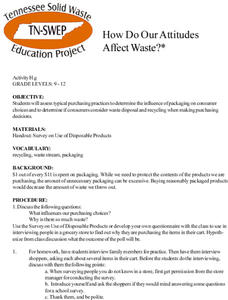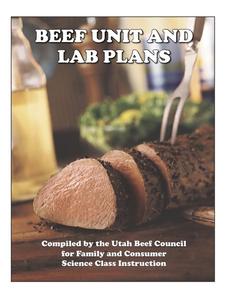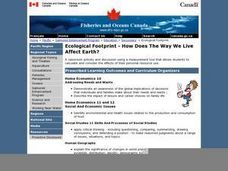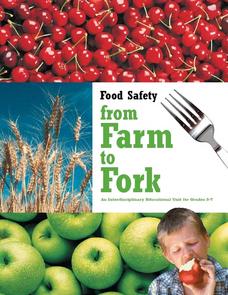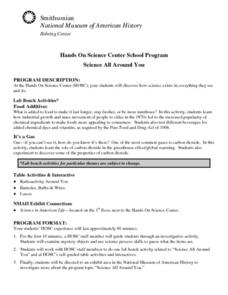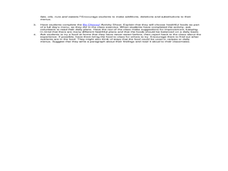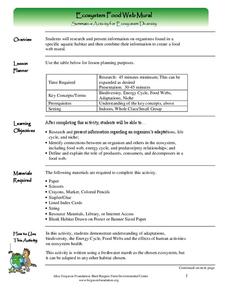Baylor College
Do Plants Need Light?
Turn your classroom into a greenhouse with a lesson plan on plant growth. First, investigate the different parts of seeds, identifying the seed coat, cotyledon, and embryo. Then plant the seeds and watch them grow! Measure the new plants...
Curated OER
How Do Our Attitudes Affect Waste?
High schoolers conduct a survey of society's typical purchasing practices to determine the influence of packaging on consumer choices and to determine if consumers consider waste disposal and recycling when making purchasing decisions.
Curated OER
Circle of Life
Here is a well-designed science lesson that shows learners that everything that organisms do in ecosystems, including running, breathing, burrowing, growing, requires energy. After a thorough discussion of their own eating and drinking...
Curated OER
Meats
A presentation about food production contains information, terminology, methodology, and chemical explanations for the process by which consumable animals are slaughtered, smoked, cured, or stored. It could fit into a food production...
Curated OER
Skulls Tell It All
Skulls tell it all, and with this lesson plan, you will tell it all to your class! Youngsters view animal skulls, analyzing the shape of teeth and the placement of the eye sockets. They associate these adaptations with the types of food...
Global Change
Impact of a Changing Climate on the Pacific Walrus
How many of us can say they've seen a Pacific walrus? Not many and one of the reasons is the impact of climate change on their aquatic environment. Children get to think about the food web of the Bering Sea by creating an actual web with...
Utah Beef Council
Beef Unit and Lab Plan
What are the proper methods for cooking various cuts of beef? What are some basic rules regarding meat food safety? Here you'll find 10 lab plans with a variety of beef cookery activities, perfect for a home economics or cooking course.
Curated OER
Farming: It's a Fact
Understanding where our food and textiles come from is key to understanding business, economics, and the importance of modern agriculture. Learners play a game, read text to determine farm fact from opinion, and itemize a grocery receipt...
NOAA
Deep-Sea Ecosystems – Entering the Twilight Zone
Imagine an ecosystem without any light or oxygen, where living things convert carbon dioxide into food. This ecosystem is thriving and might just be the largest ecosystem on our planet, yet we know very little about it. The lesson...
New South Wales Department of Education
Photosynthesis
Venus fly traps photosynthesize and consume insects because the soil they live in does not provide enough nutrients. Scholars analyze historical scientific experiments to learn how scientists discovered photosynthesis. From their...
Desert Discoveries
What's For Dinner?
Youngsters compare the teeth of plant-eating dinosaurs with those of meat-eating dinosaurs. The concepts of herbivore vs. carnivore are also introduced. There is an excellent worksheet embedded in the plan which shows five skulls of...
Baylor College
Energy Sources
Take the concept of burning calories to a more literal level in the second of seven lessons about energy in the realm of food and fitness. Using simple materials, groups will burn breakfast cereal and a pecan to see which one gives off...
Curated OER
Ecological Footprint--How Does The Way We Live Affect Earth?
Students demonstrate an awareness of the global implications of decisions that individuals and families make about their needs and wants. They identify environmental and health issues related to the production and consumption of food....
Curated OER
A Model for Natural Selection- Spaghetti Worms
Does the early bird really get the worm? If so, which color of worm does it prefer? In an exciting and easy week-long field investigation, young field biologists set up a one square meter feeding area for birds. If you have a webcam,...
NOAA
Deep-Sea Ecosystems – Life is Weird!
A pool of brine in the deep sea can be up to four times as salty as the surrounding sea water. The deep sea ecosystem relies on chemosynthesis and the organisms that live there are often strange to us. The lesson focuses on researching...
Curated OER
Food Safety From Food To Fork
Students are introduced to the concept of food safety. In groups, they distinguish between fact and opinion and cause and effect while participating in a board game. They write an essay about what knowledge they gained and review the...
Curated OER
Food Labels in the Classroom
Students read all information given on packaging; write down complete ingredients and grams of protein, carbohydrates and fat per serving. They compare the information with current health references and write a business letter to a food...
Curated OER
Wetlands - Food Web Relationships
In this food web relationships worksheet, students click on the links to learn about the food web relationships in the wetlands and answer short answer questions about it. Students complete 8 questions total.
Curated OER
Food Web Follies
Seventh graders cut and paste animal pictures to create a food web and trace the path of energy. They write a paragraph explaining the importance of photosynthesis in all food webs.
Curated OER
Where do Plants Get their Food?
In this where do plants get their food worksheet, students design an experiment that will disprove the idea that plants obtain their food from soil. Students will set up their experiment and design a data table that will record data over...
Curated OER
Science All Around You
Students visit and explore a Hands On Science Center (HOSC). They participate in a variety of self-guided table exercises and observe as scientists demonstrate various scientific principles.
Curated OER
Food For Keeps
Middle schoolers investigate the concept of food preservation. They use the internet to conduct research, specifically the methods of processing the students' favorite foods. They are introduced to the project using realia like beef...
Curated OER
How Do Foods Help Our Bodies
Students investigate the specific elements found in food that keep us healthy. In this healthy eating lesson, students identify proteins, carbohydrates, minerals, and vitamins as part of a healthy diet when consumed in moderation....
Curated OER
Ecosystem Food Web Mural
Learners create a food web mural about an ecosystem of the freshwater marsh. For this food web lesson plan, young scholars write about the organisms and how each one depends on another.



